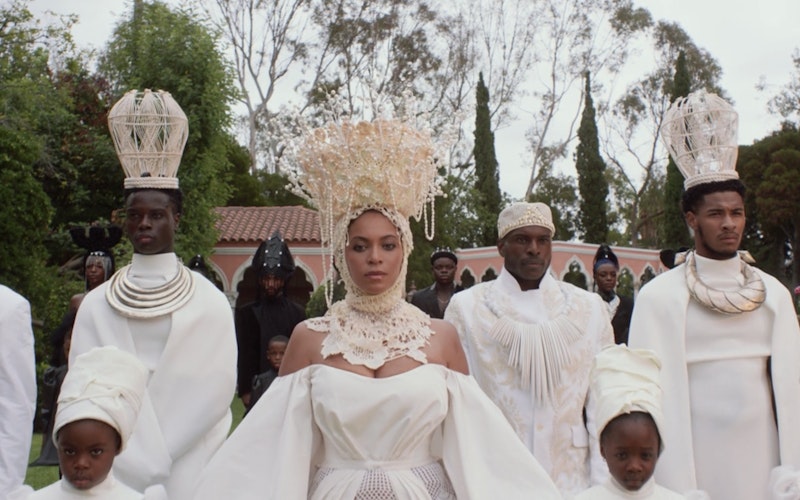
Movies
Black Is King and Our Heavenly Birthright
Any oppressive system knows that the way to ensure submission and obedience is not through the removal of a person’s rights, but through the removal of their identity.
Since the first enslaved Africans were brought to America in 1619, various forms of systemic racism have continued to dehumanize Black people. A little over 400 years have passed and the Black community is still struggling to reconcile a falsely portrayed ethnic identity with the identity God has given us. Drawing from the widely known plot of The Lion King and employing the songs she created for the 2019 remake of the Disney film, Beyoncé's visual album Black Is King traces this ongoing journey to reclaim a forgotten identity and claim our place as full members of God's kingdom.
In the opening dedication scenes of Black Is King, a newborn monarch has a ceremonial blessing spoken over him to “bless the body born celestial. Beautiful in dark matter.” The setting is a tranquil beach at sunrise with a pastel pink, orange, and purple sky. Beyoncé’s blessings over the child are sung smoothly, with faint instrumentals in the background; her vocals are soft, but heartfelt and powerful. All that are present are clothed in white to represent the purity of the moment taking place. It’s a moment that many Black people have either forgotten or failed to realize: that their creation was significant not through their own doing, but because the God of the universe crafted their existence and space in a legacy of image bearers.
Unfortunately, the young prince has also forgotten the inspired nature of his birth. Early on in Black Is King, the boy prince (JD McCrary) enters an abandoned building that is dark, save for burning fires in tin cans. A man in a white suit wearing several pieces of gold jewelry approaches the young prince; with a yellow python draped around his shoulders he asks the prince tauntingly, “Who are you?” The ensuing song, “Don’t Jealous Me,” features a fast-paced beat coupled with rhythmic lyrics, evoking intrigue and excitement. And yet, there is an underlying current—a warning that what the world offers in exchange for our identity should not be entertained. The prince admires a motorbike, even though there is a python stretched across the bike’s length and an antelope skull as an ornament. In these scenes, the color red is used to symbolize evil and frequently appears in connection with the antagonist (Warren Masemola)—an oppressive figure who manipulates the prince away from his birthright.
From there, Black Is King transitions to “MOOD 4 EVA,” a flashy variation on The Lion King’s “Hakuna Matata.” Beyoncé adorns multiple lavish outfits as she struts throughout a luxurious estate, followed closely by her butler. Her husband Jay-Z appears, carrying a cool, suave demeanor as he plays a game of chess throughout the song. While the message is clear—the young prince has seemingly made peace with his current position—the repeated chess scenes hint at something deeper. As the song fades, the chess board is mirrored by a life-size version, with people as the pieces. One side is dressed in all black, while the other side dons all white. As the human pieces move around one another on the board, the voiceover narration declares, “There’s an ongoing exchange between dark and light. You know what we call good and what we call evil. It’s not always a battle. It’s a conversation.”
The God of the universe crafted our existence and space in a legacy of image bearers.
In the Bible, the Israelites were enslaved in Egypt for hundreds of years. Generations of God’s people had their identity chipped away under Pharaoh's rule. When their first demands for freedom were made, the Israelites were met with opposition and an increased workload. (How often were the first enslaved Africans in America met with severe consequences for demanding their freedom?) Even after the Israelites were released, it was difficult for them to free their enslaved identities. At the base of Mt. Sinai, they grew restless waiting for Moses’ return, so they turned back to what was familiar to them—even if that meant worshipping idols that symbolized their former captivity.
By the end of Black Is King, there is freedom from the mindset of enslavement. Beyoncé presents the Black community with the following exhortation in the concluding song, “Spirit”:
Yeah, spirit
Watch the heavens open (open), yeah
Spirit, can you hear it callin'? (Callin')
Yeah (yeah)
Your destiny is comin' close
Stand up and fight
So go into that far off land
And be one with the great I am, I am
These lyrics are a continuation of the conversation mentioned earlier, about the battle between dark and light. Communing with the Holy Spirit concerning our heavenly identities allows us to push back against racist or prejudiced ideologies that try to diminish our self-worth. Romans 8:14-15 states: “For those who are led by the Spirit of God are the children of God. The Spirit you received does not make you slaves, so that you live in fear again; rather, the Spirit you received brought about your adoption to sonship. And by him we cry, ‘Abba, Father.’”
God created every person in his image and gave each of us a place in his holy lineage—including those within the Black community. We cannot let the familiar bondage of fear nor distorted perceptions of our ethnicity keep us from walking with the authority our Father gave us. We must all remember that God sacrificed his life for ours so that we can walk in full assurance of our self-worth and heavenly birthright.
Topics: Movies